Saying no to drugs
Drug misuse can damage your health and could possibly lead to addiction, which in turn could lead to poverty, homelessness, isolation and ultimately death.
‘This is not going to happen to me. I am in control and I am definitively not going to get addicted.’
‘All of my friends use drugs. Why should I be any different?’
‘I am brave and cool because I use drugs’
These are just some of the phrases that you or one of friends might find familiar.
Our advice is simple: Say no to drugs! And if you are already a user, get help now!
Here is a list of the common drugs, their effects, where you can get help, together with some very interesting stories from young drug users and our frontline staff.
Acid (LSD) and magic mushrooms (shrooms)
Source: Frank and NHS website
 LSD
LSD
LSD stands for its chemical name, lysergic acid diethylamide, and is commonly called ‘acid’. It’s a powerful hallucinogenic drug – this means that users are likely to experience a distorted view of objects and reality, including seeing and sometimes hearing things that aren’t there (these are hallucinations). Acid and magic mushrooms are hallucinogenics, making people see, hear and experience the world in a different, “trippy” way. Colours may become intensified and sounds distorted.
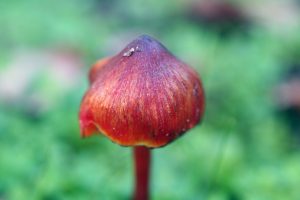 Magic mushrooms
Magic mushrooms
This is a slang word for psilocybe semilanceata or ‘liberty cap’ mushrooms (the most common type of ‘magic mushroom’ in the UK) and any other mushroom which produces similar ’trippy’ effects, like hallucinations. It is important to know that different types of ‘magic mushroom’ will differ in how strong and how toxic they are.
Effects and risks
Short term: Acid and magic mushrooms are hallucinogenics, making people see, hear and experience the world in a different, “trippy” way. Colours may become intensified and sounds distorted.
Users may also become panicky and suffer from paranoia.
The effects of acid can last 12 hours or more which, if it’s a bad trip, can be very frightening.
Long term: Some people who use LSD and magic mushrooms can experience flashbacks. Both can make existing mental health problems worse.
Get help
Contact Frank at 0300 123 6600
Frank gives also some very important advice should you ever have to help a friend or relative who’s having a bad reaction to a drug.
In an emergency, ring 999
Anabolic steroids (roids)
Sources: Frank and NHS website
 Steroids are drugs that mimic certain natural hormones in the body that regulate and control how the body works and develops. There are two main groups of natural steroids – anabolic steroids and corticosteroids. It is the anabolic steroids that tend to be misused, mainly because they are similar to the male hormone testosterone and they can improve endurance and performance and stimulate muscle growth.
Steroids are drugs that mimic certain natural hormones in the body that regulate and control how the body works and develops. There are two main groups of natural steroids – anabolic steroids and corticosteroids. It is the anabolic steroids that tend to be misused, mainly because they are similar to the male hormone testosterone and they can improve endurance and performance and stimulate muscle growth.
Effects and risks
Short term: Anabolic steroids pump up muscle mass but can also make you feel paranoid, irritable, aggressive or even violent (what’s known as “roid rage”).
Long term: People can become psychologically dependent on anabolic steroids, and convinced they cannot perform well without them.
Get help
Contact Frank at 0300 123 6600
Frank gives also some very important advice should you ever have to help a friend or relative who’s having a bad reaction to a drug.
In an emergency, ring 999
Cannabis (marijuana, weed, dope, skunk)
 Sources: Frank and NHS website It’s the most widely-used illegal drug in Britain, although the numbers of people using it are falling.
Sources: Frank and NHS website It’s the most widely-used illegal drug in Britain, although the numbers of people using it are falling.
- Cannabis is naturally occurring – it is made from the cannabis plant. The main active chemical in it is tetrahydrocannabinol (or THC for short). THC is the ingredient in cannabis that can make you feel very chilled out, happy and relaxed.
THC can also make you hallucinate, meaning that it can alter your senses, so that you might see, hear or feel things in a different way to normal.
Effects and risks
Short term: People smoke cannabis to relax and get high, but it can make it difficult to remember things. It can also cause anxiety attacks or feelings of paranoia. Long term: Cannabis may trigger long-term mental health problems, including psychosis. Cannabis users who have a family history of mental health problems and who start using it in their teens are particularly at risk. About 10% of regular cannabis users become addicted to it.
Get help
Contact Frank at 0300 123 6600 Frank gives also some very important advice should you ever have to help a friend or relative who’s having a bad reaction to a drug.
In an emergency, ring 999
Cocaine (powder cocaine, coke, crack)
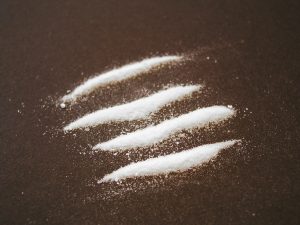 Sources: Frank and NHS website Powder cocaine (also called coke), freebase and crack are all forms of cocaine. They’re all powerful stimulants, with short-lived effects – which means that they temporarily speed up the way your mind and body work, but the effects are short-lived. Both ‘freebase’ cocaine (powder cocaine that’s been prepared for smoking) and ‘crack’ cocaine (a ‘rock’ like form of cocaine) can be smoked. This means that they reach the brain very quickly, while snorted powder cocaine gets to the brain more slowly.
Sources: Frank and NHS website Powder cocaine (also called coke), freebase and crack are all forms of cocaine. They’re all powerful stimulants, with short-lived effects – which means that they temporarily speed up the way your mind and body work, but the effects are short-lived. Both ‘freebase’ cocaine (powder cocaine that’s been prepared for smoking) and ‘crack’ cocaine (a ‘rock’ like form of cocaine) can be smoked. This means that they reach the brain very quickly, while snorted powder cocaine gets to the brain more slowly.
Effects and risks
Short term: Cocaine comes in three forms:
- powder
- freebase (where the powder is prepared for smoking)
- crack (“rocks” of cocaine that are smoked)
Cocaine is a stimulant that makes you feel high, confident and full of energy. But this can turn into feelings of anxiety, panic and paranoia. Regular cocaine users can end up feeling exhausted and depressed. Long term: Cocaine is addictive. Giving it up can be mentally distressing and physically difficult. Long-term use can make existing mental health problems worse and lead to depression, anxiety and paranoia.
Get help
Contact Frank at 0300 123 6600 Frank gives also some very important advice should you ever have to help a friend or relative who’s having a bad reaction to a drug.
In an emergency, ring 999
Ecstasy (MDMA, pills, crystal, E)
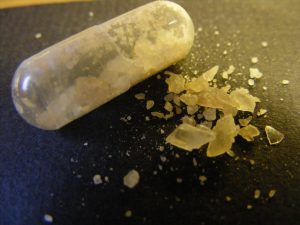 Sources: Frank and NHS website Ecstasy (also known by its chemical name, MDMA) is often seen as the original designer drug because of its high profile links to dance music culture in the late 80s and early 90s. Clubbers took ecstasy to feel energised, happy, to stay awake and to dance for hours. The effects take about half an hour to kick in and tend to last between 3 to 6 hours, followed by a gradual comedown.
Sources: Frank and NHS website Ecstasy (also known by its chemical name, MDMA) is often seen as the original designer drug because of its high profile links to dance music culture in the late 80s and early 90s. Clubbers took ecstasy to feel energised, happy, to stay awake and to dance for hours. The effects take about half an hour to kick in and tend to last between 3 to 6 hours, followed by a gradual comedown.
Effects and risks
Short term: Ecstasy is a stimulant with hallucinogenic effects that makes you feel relaxed, high, “loved-up” and ready to dance all night. But people who are already feeling anxious or who take high doses can experience paranoia or panic attacks. Long term: Regular use may lead to lack of energy, memory loss, anxiety and depression
Get help
Contact Frank at 0300 123 6600 Frank gives also some very important advice should you ever have to help a friend or relative who’s having a bad reaction to a drug.
In an emergency, ring 999
Heroin (smack, diamorphine)
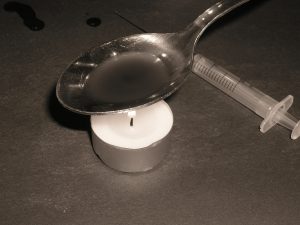 Sources: Frank and NHS website Heroin is a drug made from morphine, which is extracted from the opium poppy. Opium has been around for many hundreds of years and was originally used to treat pain, sleeplessness and diarrhoea. When morphine is made into heroin to be used as a medicine, it’s called diamorphine, and is stronger than morphine or opium. Like many drugs made from opium (called opiates), heroin is a very strong painkiller. ‘Street’ heroin sold as ‘brown’ is sometimes now used by clubbers as a chill out drug after a big night out.
Sources: Frank and NHS website Heroin is a drug made from morphine, which is extracted from the opium poppy. Opium has been around for many hundreds of years and was originally used to treat pain, sleeplessness and diarrhoea. When morphine is made into heroin to be used as a medicine, it’s called diamorphine, and is stronger than morphine or opium. Like many drugs made from opium (called opiates), heroin is a very strong painkiller. ‘Street’ heroin sold as ‘brown’ is sometimes now used by clubbers as a chill out drug after a big night out.
Effects and risks
Short term: Heroin and other opiates slow down the body and stop both physical and emotional pain. People find they need to take more and more heroin to get the same effect, or even feel “normal”. Taking a lot can lead to coma or even death. Long term: Heroin is psychologically and physically highly addictive. Withdrawal from heroin is unpleasant, and coming off and staying off it can be very difficult. Long-term heroin users may be depressed because of their overall lifestyle.
Get help
Contact Frank at 0300 123 6600 Frank gives also some very important advice should you ever have to help a friend or relative who’s having a bad reaction to a drug.
In an emergency, ring 999
Ketamine (K)
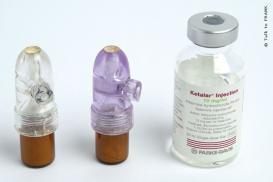 Sources: Frank and NHS website It’s a powerful general anaesthetic which stops you feeling pain and it’s used for operations on humans and animals. The effects don’t last long, but until they wear off, ketamine can cause a loss of feeling in the body and paralysis of the muscles. It can also lead to you experiencing a distortion of reality.
Sources: Frank and NHS website It’s a powerful general anaesthetic which stops you feeling pain and it’s used for operations on humans and animals. The effects don’t last long, but until they wear off, ketamine can cause a loss of feeling in the body and paralysis of the muscles. It can also lead to you experiencing a distortion of reality.
Effects and risks
Short term: Ketamine is an anaesthetic that makes people feel relaxed and high, but its effects are unpredictable. You may not be aware of what you are doing after taking it so you risk, for example, having an accident. Long term: The longer term effects may include flashbacks, losing your memory and not being able to concentrate. Regular use can cause depression and, occasionally, psychotic symptoms such as hallucinations. Ketamine can also make existing mental health problems worse.
Get help
Contact Frank at 0300 123 6600 Frank gives also some very important advice should you ever have to help a friend or relative who’s having a bad reaction to a drug.
In an emergency, ring 999
New Psychoactive Substances (NPS) - the dangers
Our frontline crews across Berkshire, Buckinghamshire, Hampshire and Oxfordshire regularly assess and treat patients who have taken NPS, seeing them often acting aggressively or violently towards the crews and members of the public who are trying to help them. NPS are substances created to mimic the effects of illegal drugs and usually sold as powders, pills, smoking mixtures, liquids and capsules – and fall into three main categories: stimulants; downers; or sedatives, psychedelics or hallucinogens.
Even if you take a NPS for the very first time, you can suffer reactions ranging from mild through to life-threatening and even fatal.
Symptoms include:
fitting, fast heart rate, choking, vomiting and unconsciousness.
NPS have serious consequences on your health and wellbeing. These can include:
- Physical: NPS can reduce inhibitions, cause drowsiness, excited or paranoid states, coma, seizures and death.
- Mental: NPS can cause serious problems to mental health such as hallucinations, paranoia, anxiety, mood swings.
- Legal: since the Psychoactive Substances Act came into effect on 26 May 2016, none of these drugs are legal to produce, supply or import (even for personal use, e.g. over the internet) for human consumption. This includes selling them or giving them away for free (even to friends) when they are going to be taken to get high.
- Social: By putting yourself at risk and through your changing behaviours as a result of taking NPS you hurt the people around you.
Here our staff share their frontline experiences of treating NPS patients:
Mark Ainsworth-Smith, Consultant Pre-Hospital Care Practitioner, Hampshire

“I received a call to attend an adult male who had decided to buy some ‘spice’. He smoked one packet of the substance before feeling very unwell and collapsing. Witnesses report that he had a fit lasting about ten minutes and therefore they dialled 999.
“On my arrival “Bill” was pale, sweaty and lying on the ground. He was extremely disorientated/ agitated and had been threatening and aggressive to members of the public who had tried to help him. He initially refused my assistance, but after approximately 10 minutes he allowed me to check his vital signs. He was paranoid and thought that the blood pressure cuff was “there to kill him”. His blood pressure and heart rate were elevated and by now he was experiencing chest pain.
“In view of his condition I decided that he needed to go to hospital and asked for back-up. An ambulance arrived, and after half an hour of persuasion he was placed in the back of an ambulance. He was aggressive and threatening and reluctantly agreed to travel to hospital.
“The ambulance crew reported that this was the second case of NPS they had attended that day.”
Paul Evans, Team Leader, Buckinghamshire

“The first was a male teen. It transpired that he’d been taking a particular brand of NPS marketed as a cocaine substitute for well over a year. Over time he’d had to increase the dosage to continue getting the same effect until he had a seizure some months before, whilst taking it. By that time he’d become addicted to the substance and couldn’t stop taking it, even knowing the dose he needed caused him to have seizures. He was having several seizures a week by this time and taking the NPS almost daily. This was the longest seizure yet having lasted over 20 minutes, only stopping after an injection of diazepam.
“The second was a female teen who had smoked a cannabis substitute. She became violent, started screaming and wouldn’t stop. When I arrived, people were restraining her because she was in a state of excited delirium, trying to tear her clothes off, head butting and punching the walls not to mention biting everyone in reach. I called for the police and she was restrained for her own safety, it took an hour for her to be calmed.
“The third was to two adolescent males who had collapsed after mixing two NPS. When I arrived one was unconscious and fitting in a pool of his own vomit and the other was projectile vomiting and being held upright by friends. I managed to roll the fitting lad into the recovery position and get oxygen on him, by that time the other had become unconscious, choking on his own vomit. I spent the next few minutes struggling to keep both their airways clear as they were vomiting whilst unconscious. One of the males started to come round, clearly not knowing who or where he was and was very combative.”
For advice and support, go to the FRANK website section on NPS
Get help
Contact Frank at 0300 123 6600
Frank gives also some very important advice should you ever have to help a friend or relative who’s having a bad reaction to a drug.
In an emergency, ring 999
Solvents (gases, glues and aerosols)
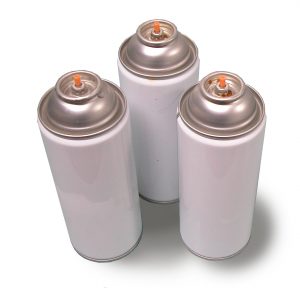 Sources: Frank and NHS website A wide range of glues, gases and aerosols contain volatile substances which, when breathed in or sniffed, get you high. Breathing in a volatile substance can make you feel uninhibited, euphoric and dizzy. But the effect they have on your heart can cause death, even if it’s your first time (known as Sudden Sniffing Death).
Sources: Frank and NHS website A wide range of glues, gases and aerosols contain volatile substances which, when breathed in or sniffed, get you high. Breathing in a volatile substance can make you feel uninhibited, euphoric and dizzy. But the effect they have on your heart can cause death, even if it’s your first time (known as Sudden Sniffing Death).
Effects and risks
Short term: Solvents make you feel high and disorientated. They can cause aggression, mood swings and hallucinations. Long term: Heavy use of solvents can damage your brain, particularly the bit that controls your movements.
Get help
Contact Frank at 0300 123 6600 Frank gives also some very important advice should you ever have to help a friend or relative who’s having a bad reaction to a drug.
In an emergency, ring 999
Speed and crystal meth (amphetamine and methamphetamine)
Sources: Frank and NHS website
Speed
It’s the street name for the Class B drug amphetamine sulphate. Sometimes speed is used to refer to other types of amphetamines. Speed is a stimulant and people take ‘speed’ to keep them awake, energised and alert.
Effects and risks
Short term: Speed can make you feel energetic and confident but it can also cause anxiety, paranoia and aggression. The “comedown” can make you feel lethargic and down, and you may have problems with concentrating and learning. Long term: Heavy use of speed can lead to anxiety, depression, irritability, aggression and paranoia. It can also cause psychotic symptoms, such as hallucinations.
Methamphetamine (Crystal meth)
Image: From www.independent.co.uk and www.rehabs.com Have a look at these pictures. Yes, this is what happens to a crystal meth user after a while. 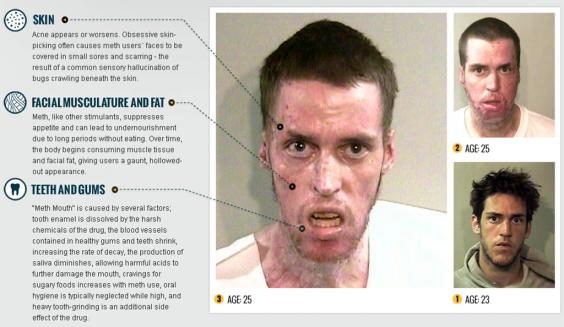 Source: Frank and NHS website Methamphetamine is part of the amphetamine family of stimulant drugs. Different amphetamines differ in how powerful they are and how they are considered under the Misuse of Drugs Act. The crystal form of methamphetamine, sometimes called Crystal Meth or Ice, is extremely powerful and addictive. Some compare it to ‘crack cocaine’ as both are smoked and give an intense, powerful ‘high’ followed by a very severe ‘comedown’, and both are very addictive Short term: The effects of crystal meth are similar to speed but more exaggerated and longer-lasting. The comedown can be worse too. Long term: Regular use of crystal meth can lead to brain damage, but this can be reversed if you don’t use the drug for a long time.
Source: Frank and NHS website Methamphetamine is part of the amphetamine family of stimulant drugs. Different amphetamines differ in how powerful they are and how they are considered under the Misuse of Drugs Act. The crystal form of methamphetamine, sometimes called Crystal Meth or Ice, is extremely powerful and addictive. Some compare it to ‘crack cocaine’ as both are smoked and give an intense, powerful ‘high’ followed by a very severe ‘comedown’, and both are very addictive Short term: The effects of crystal meth are similar to speed but more exaggerated and longer-lasting. The comedown can be worse too. Long term: Regular use of crystal meth can lead to brain damage, but this can be reversed if you don’t use the drug for a long time.
Get help
Contact Frank at 0300 123 6600 Frank gives also some very important advice should you ever have to help a friend or relative who’s having a bad reaction to a drug.
In an emergency, ring 999
Tranquillisers (benzodiazepines)
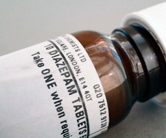 Sources: Frank and NHS website There are two types of tranquillisers – ‘major’ (which are non-addictive antipsychotics) and ‘minor’ (which are relaxants that are addictive and liable to misuse).Here we’re just talking about the ‘minor tranquillisers’. These tranquillisers can induce periods of calmness, relaxation and sleep and are used to treat anxiety and insomnia. They are prescription only medicines that can normally only be prescribed following a consultation with a doctor.
Sources: Frank and NHS website There are two types of tranquillisers – ‘major’ (which are non-addictive antipsychotics) and ‘minor’ (which are relaxants that are addictive and liable to misuse).Here we’re just talking about the ‘minor tranquillisers’. These tranquillisers can induce periods of calmness, relaxation and sleep and are used to treat anxiety and insomnia. They are prescription only medicines that can normally only be prescribed following a consultation with a doctor.
Effects and risks
Short term: Tranquillisers, such as diazepam, are sedative drugs. They are used to treat anxiety and aid sleep. Big doses of tranquillisers can affect your memory and make you drowsy. Long term: Your body quickly gets used to benzodiazepines and soon needs more to get the same effect. You can get addicted in just a few weeks. Withdrawal can be difficult and make you feel panicky, anxious and depressed. Sudden withdrawal from high doses can be very dangerous and cause seizures (fits).
Get help
Contact Frank at 0300 123 6600 Frank gives also some very important advice should you ever have to help a friend or relative who’s having a bad reaction to a drug.

